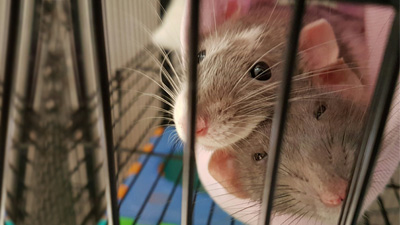What is the Best Number of Rats to Have as a Pet?

Photo by Henry Lai on Unsplash
The number of rats to have as pets is a topic that elicits much discussion among rat enthusiasts. While some prefer the companionship of just one rat, others argue that rats thrive in groups and that keeping multiple rats is more beneficial for their well-being. In this article, we will explore the debate surrounding the ideal number of rats to have as pets, considering factors such as social behavior, space requirements, and the ability to provide adequate care and attention. By understanding these considerations, you can make an informed decision on the best number of rats to have as your beloved companions.
1. Social Behavior of Rats
Rats are highly social animals that naturally live in groups in the wild. Keeping rats in pairs or small groups can provide them with the social interaction they need to thrive. Rats engage in a variety of behaviors, such as grooming, playing, and wrestling, which are important for their mental and emotional well-being. By having multiple rats, you can offer them the opportunity to engage in these natural behaviors with their cagemates.
However, it's important to note that not all rats get along with each other. Like any animals, rats have their own individual personalities, and some may not be compatible with others. When considering the number of rats to have as pets, it is crucial to carefully introduce and observe their interactions. If conflicts or aggressive behavior arise, it may be necessary to separate certain individuals to ensure the safety and well-being of all the rats involved.
2. Space Requirements
Rats are active creatures that require space to explore, play, and exercise. The more rats you have, the more space they will require to live comfortable lives. A larger enclosure or cage is essential to accommodate multiple rats, ensuring they have enough room to move around, climb, and engage in natural rat behaviors.
When determining the appropriate living space for your rats, consider not only the number of rats but also their size. Larger breeds, such as Gambian pouched rats or European Burmese rats, will need even more space than smaller breeds. Providing ample space for rats to roam and explore will contribute to their overall well-being and help prevent boredom and potential health issues that can arise from living in cramped quarters.
3. Care and Attention
One important aspect to consider when contemplating the number of rats to have as pets is the time and attention you can devote to each individual rat. Rats require daily care, including feeding, cleaning, and social interaction. The more rats you have, the more time and effort will be required to meet their needs adequately.
If you have a busy lifestyle or limited time to dedicate to rat care, having fewer rats may be a more manageable option. It's essential to provide each rat with individual attention and handling, ensuring they receive the social interaction and mental stimulation necessary for their well-being. Neglecting the needs of multiple rats due to time constraints can have negative effects on their health and overall happiness.
4. Financial Considerations
Owning pets always comes with financial responsibilities, and having rats is no exception. The number of rats you choose to keep as pets will impact the costs associated with food, bedding, veterinary care, and other rat supplies. Before deciding on the number of rats to have, consider your budget and ensure you can provide for their health and well-being without causing financial strain.
Additionally, keep in mind that as the number of rats increases, so does the potential for medical expenses. Rats can develop health issues that require veterinary attention, and having multiple rats increases the likelihood of facing such situations. It is important to be prepared for unexpected expenses that may arise from owning multiple rats.
Making Your Decision
While it is true that rats are social animals and benefit from companionship, it is not necessarily a hard and fast rule that they always need to be kept in pairs. Some rats may indeed become lonely and bored living alone, but others may thrive in a single-rat household as long as they receive adequate social interaction and stimulation from their human caregivers.
However, if you are unable to spend a significant amount of time with your rat or provide the social interaction it needs, having at least two rats may be a better option. Rats kept in pairs or small groups can engage in natural behaviors such as grooming, playing, and wrestling, which can contribute to their overall well-being. They can also provide companionship for each other when you are not available to interact with them.
Ultimately, the decision to have one or more rats as pets should be based on your individual circumstances, ability to meet their needs, and the rat's personality and preference. It is important to research rat care and behavior, as well as consider the advice of experts and reputable sources, to make an informed decision that is best for both you and your rat companions.
You May Also Like
 Pet RatsWhich Are Better Pets: Male or Female Rats?
Pet RatsWhich Are Better Pets: Male or Female Rats? Pet RatsExploring The 4 Largest Pet Rat Breeds
Pet RatsExploring The 4 Largest Pet Rat Breeds Pet RatsExploring the 7 Different Types of Pet Rats
Pet RatsExploring the 7 Different Types of Pet Rats Pet RatsAre Rats a Good Pet? Exploring the Benefits of Pet Rats
Pet RatsAre Rats a Good Pet? Exploring the Benefits of Pet Rats Pet RatsWild Rats vs. Pet Rats: What Is the Difference?
Pet RatsWild Rats vs. Pet Rats: What Is the Difference? Help & AdviceExploring 10 Easiest Exotic Pets to Take Care Of
Help & AdviceExploring 10 Easiest Exotic Pets to Take Care Of